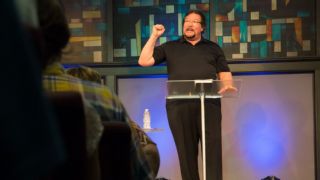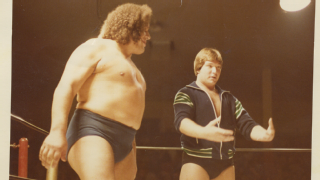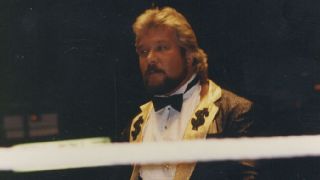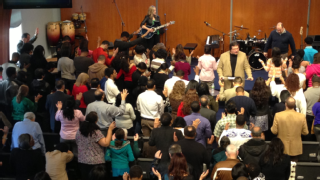|
MIDDLEFIELD, Conn. -- It is nearly 11 p.m. on a late-August evening, and we're up in the sanctuary at Victory Christian Church. The congregation that once filled the church is gone, and just four of us remain: a publicist, the pastor, myself, and the subject of the interview. I prop my camera up with a few books and DVDs that went unsold. We do a check for audio levels, and then it happens. The quiet, humble man I had met only hours earlier unleashed it. He belted out that loud, diabolical laugh that only one man could deliver. It was Ted DiBiase's alter ego, the "Million Dollar Man." DiBiase's pro wrestling career spanned four decades, from 1974-2006, to be specific, with his most significant WWE years coming in the late 1980s and early 90s. Now, at age 62, DiBiase is deep into his second career, doing what he has done for the last 16 years. "I'm preaching the gospel," DiBiase says. "The last thing I thought I would be doing is traveling the country and traveling the world preaching the gospel of Jesus Christ, but God had a plan and nobody is more surprised than me. A lot of people who knew me before have been equally surprised over the years." On this warm summer night, DiBiase had just completed a one hour sermon, sharing his life story. In the speech, DiBiase was honest and vulnerable, traits contrary to his once popular heel persona. Afterward, DiBiase had an alter call, where he prayed and the congregation of 250 took an offering for him. It was the first of three sermons in three days, and DiBiase collected $3,500 for his ministry, Heart of David. He says he speaks at about 35 churches, conferences, seminars and workshops annually, with multiple days at each of those locations. He also speaks in prisons, schools and rehabilitation centers. "If it hadn't been [for] what Vince McMahon did for me, I wouldn't be able to do what I do now. I wouldn't be able to go places," DiBiase says.  DiBiase was raised in Wilcox, Arizona, and growing up, DiBiase says he was a Christian. His father was a professional wrestler known by the moniker "Iron" Mike DiBiase in the 1950s and 60s and, like his father, Ted became a superb athlete. He went to West Texas on a football scholarship, but football wasn't ultimately in Ted's future; he wanted to follow in his father's footsteps. He'd soon start training with Dory and Terry Funk, brothers and two of the most legendary competitors of the territory era. DiBiase's career began in the mid-1970s in Mid South Wrestling, followed by short stints wrestling for Vince McMahon Sr. and Jim Crockett, along with some time spent in Japan. By 1987, Ted knew he needed to perform for the biggest wrestling organization in the world. "WrestleMania 3 takes place, and on the front page of the newspaper, it says 'WrestleMania sets indoor world attendance record,' and right there I said, 'That's it, if I am going to stay in this business and make a living, I am going to have to work for this company in the United States,'" DiBiase says. DiBiase says he made it known that he wanted to work for WWE Chairman and CEO Vince McMahon's organization, at the time known as the WWF. Soon after, McMahon invited him to come to headquarters in Stamford, Connecticut, to discuss a potential character. "He said 'I got something for you,'" DiBiase says. "There have been so many things that have been done, but this has never been done, and just based on what I have seen from you, and your work, you can pull this off -- you are articulate. And I go, 'Awesome, what is it?'" DiBiase says. "And he goes, 'Here is the deal -- you have got to sign a contract with me before I tell you.' And [McMahon] said, 'Here is why.' He says, 'If I tell you, and you don't sign, I have given away a great idea, and I can't afford to do that.' I'm like, 'Wow,' and I said 'Okay, I got to have a little time to think about this.'" DiBiase flew home and discussed the opportunity with his wife Melanie, whom he had married in 1981, and his longtime friend and mentor Terry Funk. "Funk said, 'Teddy, if Vince McMahon has an idea, and he thinks you are tailor-made for it,' he said, 'pack your bag and don't look back. Go,'" DiBiase says. In the spring of 1987, DiBiase agreed to work for McMahon and the WWF without knowing what he would be doing. He called McMahon and told him he was in, but McMahon wouldn't tell him the idea over the phone, so DiBiase flew back to Connecticut to meet with his new boss. It was then he learned about McMahon's idea. "He said the one thing everybody hates is someone who by virtue of their wealth thinks they are better than everybody. You know, that cocky, arrogant, nose in the air, 'I am better than you,' looks down at people [kind of guy]. People like that are stuffy and think they can buy anybody and anything. I start chuckling and say, 'I hate people like that myself,'" DiBiase says. "He said, 'Now, we have not given this guy a name yet,' and just off the cuff I said, 'It sounds like a million-dollar man to me,' and Vince goes 'The Million Dollar Man he is.'" In order to protect the image of this character, McMahon wanted to dramatically change DiBiase's life away from the ring. That meant first-class travel, flights, limo service and cash. "In an effort to market this character, we are going to try to the best of our ability to make the public believe you are this Million Dollar Man," DiBiase says, recalling McMahon's sentiments on building a believable back story. "'Everywhere the public sees you they are going to see the appearance of wealth ... and then the flash cash.' "I said, 'Flash cash?'" "He said, 'You know how annoying it is if you walk in a store, you just bought a pack of gum, you throw down a hundred-dollar bill, and they have to make change? I want you to do things like that. Go to a restaurant, have Virgil with you, and just get up and announce yourself, and say, "Folks, it is your lucky day. I am the Million Dollar Man from WWF, and I'm picking up your tab." Have Virgil get everyone's ticket, throw down some hundreds, have Virgil get the receipt, bring the receipt back to the office, we replenish it.' I only did that a couple times." At the height of his success, DiBiase was paid $500,000 to play the Million Dollar Man character that McMahon created. "If Vince was going to put on the tights and be a character in his own show, this is who it is, you are his alter ego," DiBiase says.  The Million Dollar Man was born, and in May 1987, DiBiase debuted his new character at a house show in Houston, Texas. He wore shiny, gaudy suits, with dollar signs all over the front and back. His promos became must-see TV, often culminating with the slogan 'Everybody's got a price for the Million Dollar Man!' He would shove a hundred dollar bill in the mouth of his opponents after defeating them with a finishing move he dubbed, the "Million Dollar Dream." DiBiase thrived under McMahon. "I am making appearances on the 'Tonight Show' and 'Regis and Kathy Lee,'" DiBiase says. "Action figures and video games, and Learjets and limousines, and wow, and that is just it. I got all caught up in that, and the pace. We were literally like rock stars: next town, next show, next show, next party, and, you know, the all rock 'n' roll [lifestyle] -- drugs, sex and rock 'n' roll." It was during this period that DiBiase says he became unfaithful to his wife, Melanie. He says life on the road was lonely, and fame isn't what people perceive it to be. "You go down to the bar, and you have a beer with the boys, and for some, the one turns into two-and-a-half dozen, and you get addicted to the alcohol," DiBiase says. "I like to drink beer, but I never had an alcohol problem, and I didn't like pot. I did some cocaine, because cocaine would keep me awake, would keep me going, like 'Okay, we got to go.'" DiBiase says he never became an alcoholic or drug addict but did succumb to many women while he was on the road. While life on the road was, at times, chaotic and destructive, DiBiase's star was quickly rising within the squared circle. His career was building to a moment that wrestling fans of the era can remember vividly: Feb. 5, 1988. It was a Friday, and on that night, the WWF aired a live show called "The Main Event" in prime time on NBC. DiBiase was featured prominently in the episode, and the storyline was his biggest and most high-profile opportunity with the company to date. On this night, DiBiase planned to buy the WWF world heavyweight championship, and to get the job done, he hired Andre the Giant to defeat Hulk Hogan. It would be the first clash between Andre and Hogan since their legendary meeting at WrestleMania 3. On this night, unlike most big matches of the era, Hogan was going to lose -- albeit because of some inspired trickery. "The thing about that particular night, I didn't know what I was doing until I got to the building. They kept it a secret, and I didn't even know that Dave Hebner (the referee) had a brother, let alone a twin," DiBiase says. Back then, DiBiase says, the wrestlers didn't run through a formal rehearsal. Instead, they planned the matches backstage. The match between the two played out in a fairly predictable manner until, eventually, Virgil grabbed Hogan's leg as he attempted to land his patented leg drop. With Dave Hebner distracted, Andre head-butted and then hip-tossed Hogan and covered him for the pin. In the confusion, among other distractions, another referee -- Dave's twin brother, Earl -- jumped in the ring and counted to three while Hogan's shoulder was clearly raised off the mat. Andre was declared the new heavyweight champion among the chaos, and he immediately handed DiBiase the title belt making the Million Dollar Man the new champ, for the time being. The live broadcast reportedly drew 33 million viewers -- at the time, a record for American-televised wrestling. "Back through gorilla (the curtain) was excitement, like that was so good, that was so good," DiBiase says. "I remember we had to do post-match interviews, and I was just hot. I was on that night. That was a proud moment for me, one of the biggest moments of my career." DiBiase got to wear the belt for a very short stint -- he says a week or so -- but then the win was nullified. The WWF championship was vacated, setting up a tournament to crown a new champion at WrestleMania 4. In one scenario, DiBiase says, it was discussed backstage that he would win that tournament and go on to feud with Hogan. While that didn't pan out, DiBiase did make the finals of the tournament, only for Hogan to return the favor and cost him the match against "Macho Man" Randy Savage. Rather than having DiBiase as the WWF champion, another idea was hatched -- one that rang far truer for The Million Dollar Man. "Pat Patterson approached me and said, 'Rather than do that which is the expected thing, you don't win it at Mania. In your arrogance, you create your own title,'" DiBiase says. "And as soon as he said it, I was like, 'That is the ticket!' That is going to make everybody hate my guts -- design my own belt and declare that I am a champion."  Following WrestleMania 4, DiBiase says he spent the better part of 1988 traveling with his tag-team partner, Andre the Giant. DiBiase had known Andre for several decades at that point, and at the time, he says Andre was physically hurting, yet never complained. "Andre's health was not good," DiBiase says. "There were nights when we would go to the ring, and Andre has his hand on my shoulder, and to the public it just looks like well, 'He is my buddy right?' He is balancing. I am his crutch. He hated drugs, and so the way Andre sedated himself was the alcohol. Everybody says, 'Well, he drank a lot.' Well, he did drink a lot, but in all the years I knew him and was around him, I never saw him stagger or stutter, and I never saw him out of control. Ever. Not one time." There are many legends of Andre's incredible tolerance for drinks, and DiBiase certainly recalled a few times when he watched Andre in action. On one occasion, while DiBiase was in college at West Texas State University, he and Andre went to a local bar in Amarillo, Texas. "I think it was like four cases of beer on ice," DiBiase says. "That is the most I ever saw him drink." After a show in '88 in San Francisco, DiBiase recalls the duo heading back to the airport Marriott bar for an equally incredible evening. "He bought ten bottles of Dom champagne. I don't know what it is now, but back then it was a hundred bucks a bottle," DiBiase says. "I mean, he spent a thousand dollars on champagne! I definitely wasn't living for Jesus then." DiBiase's other on-screen partner in crime at that time was Virgil, his bodyguard and personal assistant. DiBiase says Virgil (real name Mike Jones) was the polar opposite of most guys on the road at that time -- he always showed up on time, and he didn't drink, smoke or use drugs. It was a harmonious pairing while things were at their peak. In 1991, Virgil and DiBiase became on-screen rivals, with Virgil ultimately getting the best of the scenario and briefly winning the Million Dollar title from DiBiase. Virgil eventually received a WWF championship match against then-champion Bret Hart down the line, but after lingering around on the undercard for some time, he eventually made his way to WCW in 1996 at around the same time as DiBiase's departure. They rarely interacted from that point on, and their relationship at this time is strained and virtually nonexistent. By 1992, DiBiase had a new tag-team partner in Irwin R. Schyster, better known as I.R.S, and together they were called Money, Inc. In April of that year, at WrestleMania 8 in Indianapolis, Indiana, the duo defended and reatained their WWF tag-team titles despite a loss by disqualification. DiBiase says that after winning the championships -- one of the highlights of his career -- he went out and partied all night. Eventually he called home to check in with his wife Melanie. In a moment, several realizations hit him all at once, as his lifestyle on the road finally caught up with him, and the real-world consequences of his decisions came home to roost. "My wife hits me with what she had now discovered -- adultery in my life, and not just one or two [incidents]," DiBiase says. "I said to her, 'I want to talk about this, I'll be on the next plane home,' and she said, 'No, you won't. You don't live here anymore' ... Click. My immediate response was 'Oh God, oh God, help me." Ted says his infidelity nearly ended his second marriage, but with his realization and recommitment to his wife, Melanie agreed to go to marriage counseling. Ted says he confessed all of his sins to Melanie, and eventually, he says his wife forgave him and gave him a second chance. It was that moment -- that second chance, according to DiBiase -- when he recommitted his life to Jesus. "I became an authentic Christian," he says. DiBiase no longer wanted to live the high life on the road. After winding down his in-ring career and largely becoming a manager, in 1996, he left the WWF for WCW. He claims those were the worst three years of his career. As he continued to play a character whose god was money, Ted's was Jesus. After getting fed up with his on-screen role at WCW, DiBiase briefly became a road agent and finally left once his three-year contract expired in late 1998.  In 2000, DiBiase says he spoke for the first time in a church. Paducah, Kentucky, was where his life changed; it was where he became a minister. "I had never prayed for anybody, but a tall, red-headed, freckled boy buried his head in my neck just crying," DiBiase says. "He said, 'All my life, my parents and my grandparents have tried to make me understand why I need Jesus, I didn't get it.' He said, 'Tonight, through your story, I got it,'" DiBiase pauses, his eyes watering. "I sat there and realized God has just used me to change this kid's life. I have wrestled in front of 80,000 people at Wembley Stadium, and that is a pretty big thrill. [But] that didn't touch what this moment did in my life." DiBiase eventually returned to the WWE and worked backstage until 2006. He made sporadic appearances after that point for the company, including a return for his induction into the WWE Hall of Fame in 2010. Unlike many of his in-ring colleagues from the era, DiBiase says he is in a good place now; this year, Ted will celebrate his 35th wedding anniversary with Melanie. He says his marriage is strong, that he and Melanie enjoy spending time with their sons and grandchildren. It's a drastic departure from the glittery dollar-sign suits and the bright lights of Wrestlemanias, but it's exactly where he wants to be. He is no longer the Million Dollar Man. Now he's just Pastor Ted. "I walked away from a lot, I could have stayed in the industry in some capacity and had a fairly cushy income, and I chose to follow God," DiBiase says. "If it happened all over again, I would do that same thing." Ben Houser is a Coordinating Producer on E:60 and Outside the Lines, as well as a contributor to "WWE on ESPN".
|
